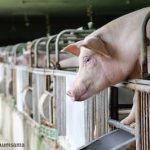The U.S. Food and Drug Administration's Center for Veterinary Medicine (CVM) is starting the process of rescinding approval of the use of carbadox, an antibiotic, to treat swine because it may leave trace amounts of a carcinogen in the meat. The agency recently reexamined the safety profile of the drug and concluded that there could be "potential risk to human health from ingesting pork, especially pork liver, derived from carbadox-treated pigs." Michael R. Taylor, FDA deputy commissioner for foods and veterinary medicine said in a statement, "the manufacturer of carbadox has failed to provide sufficient scientific data to demonstrate the safety of this drug given evidence that carbadox may result in carcinogenic residues. As a result, FDA's Center for Veterinary Medicine is taking … [Read more...]
Senators Ask FDA to Collect More Antibiotic Data
Four U.S. Senators have written a letter to the FDA to ask that agency to increase tracking of antibiotics used in food animals. They want the agency to propose a rule that improves collection of data on farm antibiotic use and its connection to bacterial resistance. Senators Dianne Feinstein (D-CA), Tom Harkin (D-IA), Kirsten Gillibrand (D-NY), and Elizabeth Warren (D-MA) all wrote the letter. It states, "we applaud your agency's recent step to issue improved, more transparent reports on annual food animal antibiotic drug sales and distribution data. However, we are disappointed to learn that your agency has decided to delay proposing a rule that would further enhance data collected on this topic until next year, when the OMB estimated the rule would be released in 2014." Foodborne … [Read more...]
FDA Withdraws Approval of Arsenic in Animal Feed
>On September 30, 2013, the Food and Drug Administration responded to a Center for Food Safety petition, calling for the immediate withdrawal of the "vast majority of arsenic-containing compounds used as feed additives for chicken, turkeys and hogs." A lawsuit filed by that agency, along with the Institute for Agriculture and Trade Policy, Food & Water Watch, Center for Environmental Health, and Health Care Without Harm, among others, compelled the response. FDA is going to withdraw three of the four arsenicals and all drug approvals related to those compounds. That means of the 101 drug approvals for arsenic-based products, 98 will be withdrawn. Paige Tomaselli, senior attorney with the Center for Food Safety, said in a statement, "the withdrawal of these harmful feed additives … [Read more...]
FDA Allows Salmonella in Livestock Feed
The FDA has released a Compliance Policy Guide on Salmonella contamination in food for animals. The agency claims that they are "targeting resources more effectively to protect the health of both animals and humans" Because pet food is often handled by consumers, those products are considered contaminated if they contain Salmonella bacteria. The products include dog and cat foods, aquarium fish foods, treats, chews, nutritional supplements, and other pet products. But for livestock and horse feeds, the risk-based enforcement policy is focusing only on certain strains of Salmonella. The press release states "because people are much less likely to come into direct contact with animal feeds, FDA is most concerned about the strains of Salmonella that are capable of causing disease in the … [Read more...]
U.S., Canada Sign Agreement on Animal Disease Zoning
Agriculture Minister Gerry Ritz announced yesterday that Canada and the United States are recognizing each other's zoning measures during highly contagious foreign animal disease outbreaks. That means that each country will "accept the other's decisions on establishing, maintaining, and releasing a disease control and eradication zone if an outbreak of a foreign animal disease, such as foot-and-mouth diseases or classical swine fever, occurs." In a statement, Ritz said, "cross-border trade in live animals, meat and other animal products and by-products contributes billions of dollars each year to Canada's economy. This arrangement will keep U.S. market opportunities open for Canadian producers should a foreign animal disease outbreak occur, all while protecting human and animal health." … [Read more...]
Public Interest Groups Join International Chorus: No Ractopamine In US Meat
Two public interest groups are the latest to add their voices to an international chorus of concern about the feed additive ractopamine. The Center for Food Safety and the Animal Legal Defense Fund have filed a petition with the U.S. Food and Drug Administration (FDA) calling for the agency to reduce allowable levels of the drug and to conduct a comprehensive study of its effects on human and animal health. The petition comes on the heels of Russia’s December announcement that will add its name to the list of roughly 160 countries that ban or restrict ractopamine, including China, Taiwan and every member nation in the European Union. Manufactured by Elanco, a division of Eli Lilly, ractopamine goes by different names for different animals applications: Paylean for pigs, Optaflexx for … [Read more...]
Court to FDA: Stop Stalling On Antibiotics In Animal Feed
After 35 years of stalling, the U.S. Food and Drug Administration (FDA) may finally be compelled to take action on one of the biggest public health issues of our time: antibiotic resistant bacteria or, superbugs. In a ruling last week, the U.S. District Court, Southern District of New York, told the FDA that it’s time to stop stalling and start implementing a schedule for withdrawal of all non-therapeutic antibiotics in animal feed. Although the Natural Resources Defense Council (NRDC) agrees on both counts, the two are on opposing sides of a lawsuit on the issue. In 2011, the NRDC, the Center for Science in the Public Interest, Food Animal ConcernsTrust (FACT), Public Citizen Inc. and Order Union of Concerned Scientists, filed suit against the FDA to end the use of antibiotics in … [Read more...]
Can Animals Make Us Sick? Yes.
Animal Health was the topic of a June 22 event on Capitol Hill called “From Fido to Food Safety: Roles, Responsibilities and Realities Veterinarians Face in Protecting Public Health,” that was hosted by the American Veterinary Medical Association and the Animal Health Institute. During his keynote address, USDA Chief Veterinary Officer John Clifford, stated that zoonotic diseases, which are diseases that are transmitted from animals to humans, have accounted for 75 percent of emerging infectious diseases among humans over the last three decades. Zoonotic diseases include diseases that can be contracted from contact with live animals such as rabies or Lyme’s disease and from animals used as a food sources such as Salmonella and E.coli. So far this year there has been: one … [Read more...]












